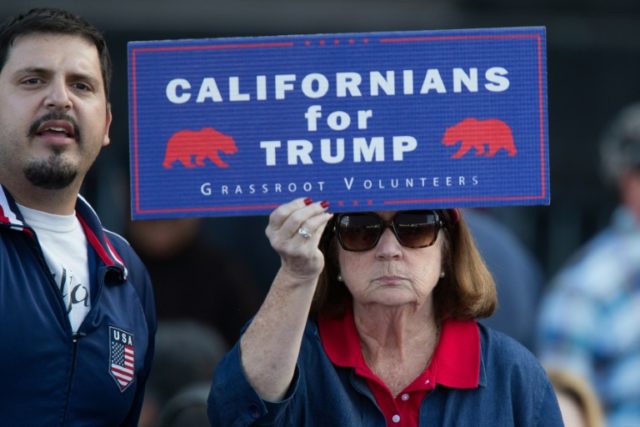Even after Republican frontrunner Donald Trump’s win in the Indiana primary on Tuesday, he will still likely need to win the June 7 California primary to reach the 1,237-delegate majority necessary to win the Republican presidential nomination outright.
(Update: Ted Cruz has withdrawn after his defeat in Indiana.)
In fact, Trump could have shut out Sen. Ted Cruz (R-TX) entirely in Indiana, and he would still need to win the California primary to reach 1,237 — though winning Indiana would let Trump win California by a small majority and still win the nomination.
Much depends on how many delegates Trump is thought to have won thus far. ABC News estimates that Trump has already won 998 delegates as of May 2, the day before the Indiana primary. CNN puts the number even higher, at an estimated 1002 delegates. Fivethirtyeight.com puts Trump’s total far lower, at 957. (The differences are attributable to estimates of “unbound” delegates — those who are not required to vote for a candidate on the first ballot, but may have committed to one regardless.)
That means Trump must win between 235 and 280 delegates in the remaining contests. He may fail to win any in the winner-takes-all contests in Nebraska (May 10), South Dakota (June 7), and Montana (June 7) (though Trump could score upsets).
He will likely pick up all 51 of New Jersey’s winner-takes-all delegates, meaning that he must find between 184 and 229 elsewhere. West Virginia (May 10) elects individual delegates pledged to individual candidates, and Oregon (May 17), Washington (May 24) and New Mexico (June 7) award delegates on a proportional basis. Collectively, those states offer 103 delegates, some of which will go to Cruz: if he performs modestly well, he could hold Trump to around 63 of those delegates.
Thus, without Indiana and California, Trump would still probably need to win somewhere between 121 and 166 delegates. He could win none in Indiana, and still have a chance of reaching the nomination, since California has 172 delegates. It would, however, be very hard for Trump to win nearly every congressional district in the Golden State, which awards three delegates per district on a winner-takes-all basis, and 13 additional delegates to the statewide winner (also on a winner-takes-all basis).
Theoretically, with every delegate in Indiana, which has a system similar to California’s, there is a slim chance Trump could lose California and still win the nomination. More realistically, if Trump edges Cruz in Indiana, taking five of nine districts, then he will win 45 delegates, meaning he will need to win between 81 and 121 in California. Winning 85 delegates in the Golden State almost certainly requires winning statewide, unless Trump wins 27 of the state’s 53 districts but loses overall.
Breitbart News has projected that Trump would win 106 delegates in California, if the primary were held today (early voting by mail begins next week). That suggests Trump is likely to clinch the nomination in California. But it is by no means certain that he will do so.
In fact, if Cruz fights hard enough — perhaps abandoning the pact with Ohio Gov. John Kasich that prevents him from campaigning in Oregon or New Mexico — he can stop Trump at the goal line, and produce a contested convention in July.
This post has been updated to reflect Trump’s win in Indiana.

COMMENTS
Please let us know if you're having issues with commenting.